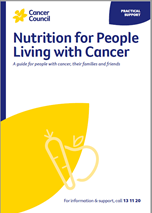- Home
- Pancreatic cancer
- Managing your diet and nutrition
- Nausea and vomiting
Nausea and vomiting
Nausea and vomiting can occur because of the cancer or its treatment.
Learn more about:
Overview
For some people, just the thought of treatment or eating or the smell of food can make them feel unwell. There is a range of anti-nausea medicines that you can take regularly to control symptoms. If the one you are prescribed doesn’t work, let your doctor or nurse know so you can try another medicine.
Let your doctor know if vomiting lasts for more than a day or if you can’t keep any fluids down, as you may become dehydrated. Signs of dehydration include a dry mouth, dark urine, dizziness and confusion.
If you have persistent vomiting, the duodenum (the first part of the small bowel) may be blocked, so see your doctor as soon as possible. You may need surgery to clear the blockage. You may need surgery to clear the blockage.
Coping with nausea
- Talk to your doctor about taking anti-nausea medicine half an hour before meals.
- Snack on bland foods such as dry crackers or toast.
- Try to eat a little bit at regular intervals – not eating or skipping meals can make nausea worse.
- Eat and drink slowly. Chew food well.
- Avoid strong odours and cooking smells.
- Drink ginger beer, ginger ale or ginger tea, or suck on candied ginger.
- Suck peppermint or lemon-flavoured boiled lollies.
- See below for tips on dealing with vomiting.
Steps to recovery after vomiting
1. Take small sipsDon’t try to force food down. Sip small amounts of liquid as often as possible. Try flat dry ginger ale, cold flat lemonade, weak cordial, or cold apple or orange juice. | |
2. Introduce nourishing fluidsIf the vomiting has stopped but you still feel sick, slowly introduce more nourishing fluids. Start with cold or iced drinks. Prepare milk or fruit drinks with some water so they are not too strong. You can also try diluted fluids such as clear broth or weak tea. | |
| | 3. Start solid foodNext, try to eat small amounts of solid foods, such as plain dry biscuits, toast or bread with honey or jam, or congee (rice porridge) with little texture. Stewed fruits and yoghurt are also good. Aim to eat small amounts of food often, rather than three large meals a day. |
| | 4. Return to normal dietAs soon as you can, increase your food intake until you are eating a normal, balanced diet. Limit rich foods, such as fatty meats or full-cream dairy products. Your doctor or dietitian may suggest extra nourishment (such as nutritional supplements) on your good days to make up for the days you can’t eat properly. |
Podcast: Appetite Loss and Nausea
Listen to more episodes from our podcast for people affected by cancer
More resources
Dr Benjamin Loveday, Hepato-Pancreato-Biliary (HPB) Surgeon, Royal Melbourne Hospital and Peter MacCallum Cancer Centre, VIC; Dr Katherine Allsopp, Palliative Medicine Physician, Crown Princess Mary Cancer Centre, Westmead Hospital, NSW; Hollie Bevans, Senior Dietitian, Radiotherapy and Oncology, Western Health, VIC; Dr Lorraine Chantrill, Head of Department Medical Oncology, Illawarra Shoalhaven Local Health District, NSW; Amanda Maxwell, Consumer; Prof Michael Michael, Medical Oncologist, Lower and Upper GI Oncology Service, Co-Chair Neuroendocrine Unit, Peter MacCallum Cancer Centre and University of Melbourne, VIC; Dr Andrew Oar, Radiation Oncologist, Icon Cancer Centre, Gold Coast University Hospital, QLD; Meg Rogers, Nurse Consultant Upper GI/NET Service, Peter MacCallum Cancer Centre, VIC; Ady Sipthorpe, 13 11 20 Consultant, Cancer Council WA.
View the Cancer Council NSW editorial policy.
View all publications or call 13 11 20 for free printed copies.
Need to talk?
Support services
Life after cancer treatment
Webinars, exercise and nutrition, sexuality programs, and back-to-work support
Need legal and financial assistance?
Pro bono services, financial and legal assistance, and no interest loans
Cancer information
Nutrition after cancer treatment
Healthy eating habits to help you maintain good nutrition
Nutrition and cancer help for carers
Tips for preparing food for someone with cancer

